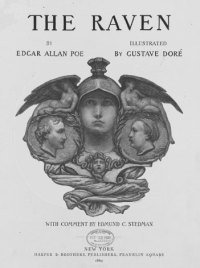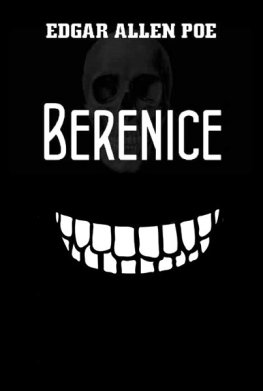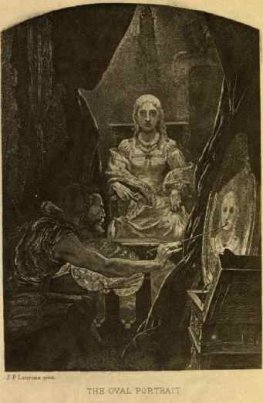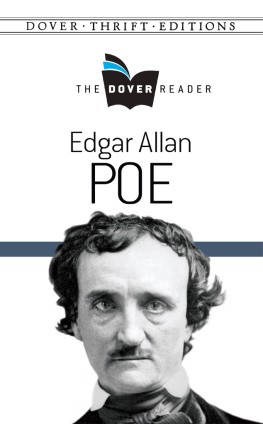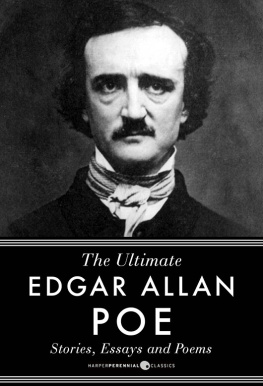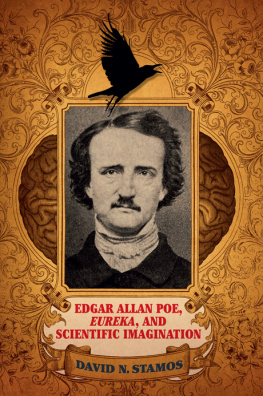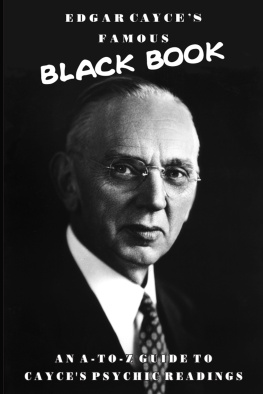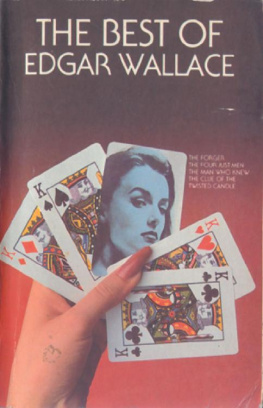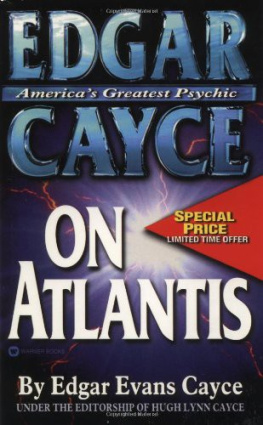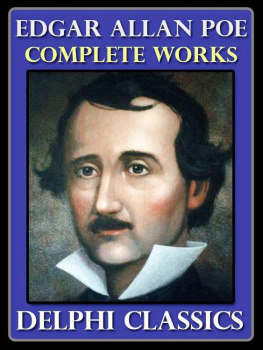Edgar Poe - The Literary Life of Thingum Bob, Esq.
Here you can read online Edgar Poe - The Literary Life of Thingum Bob, Esq. full text of the book (entire story) in english for free. Download pdf and epub, get meaning, cover and reviews about this ebook. genre: Prose / Humor. Description of the work, (preface) as well as reviews are available. Best literature library LitArk.com created for fans of good reading and offers a wide selection of genres:
Romance novel
Science fiction
Adventure
Detective
Science
History
Home and family
Prose
Art
Politics
Computer
Non-fiction
Religion
Business
Children
Humor
Choose a favorite category and find really read worthwhile books. Enjoy immersion in the world of imagination, feel the emotions of the characters or learn something new for yourself, make an fascinating discovery.

The Literary Life of Thingum Bob, Esq.: summary, description and annotation
We offer to read an annotation, description, summary or preface (depends on what the author of the book "The Literary Life of Thingum Bob, Esq." wrote himself). If you haven't found the necessary information about the book — write in the comments, we will try to find it.
The Literary Life of Thingum Bob, Esq. — read online for free the complete book (whole text) full work
Below is the text of the book, divided by pages. System saving the place of the last page read, allows you to conveniently read the book "The Literary Life of Thingum Bob, Esq." online for free, without having to search again every time where you left off. Put a bookmark, and you can go to the page where you finished reading at any time.
Font size:
Interval:
Bookmark:
The Literary Life of Thingum Bob, Esq.
by Edgar Allan Poe
I am now growing in years, andsince I understand that Shakespeare and Mr. Emmons are deceasedit is not impossible that I may even die. It has occurred to me, therefore, that I may as well retire from the field of Letters and repose upon my laurels. But I am ambitious of signalizing my abdication of the literary sceptre by some important bequest to posterity; and, perhaps, I cannot do a better thing than just pen for it an account of my earlier career. My name, indeed, has been so long and so constantly before the public eye, that I am not only willing to admit the naturalness of the interest which it has everywhere excited, but ready to satisfy the extreme curiosity which it has inspired. In fact, it is no more than the duty of him who achieves greatness to leave behind him, in his ascent, such landmarks as may guide others to be great. I propose, therefore, in the present paper (which I had some idea of calling "Memoranda to Serve for the Literary History of America") to give a detail of those important, yet feeble and tottering, first steps, by which, at length, I attained the high road to the pinnacle of human renown.
Of one's very remote ancestors it is superfluous to say much. My father, Thomas Bob, Esq., stood for many years at the summit of his profession, which was that of a merchant-barber, in the city of Smug . His warehouse was the resort of all the principal people of the place, and especially of the editorial corpsa body which inspires all about it with profound veneration and awe. For my own part, I regarded them as gods, and drank in with avidity the rich wit and wisdom which continuously flowed from their august mouths during the process of what is styled "lather." My first moment of positive inspiration must be dated from that ever-memorable epoch, when the brilliant conductor of the "Gad-Fly," in the intervals of the important process just mentioned, recited aloud, before a conclave of our apprentices, an inimitable poem in honor of the "Only Genuine Oil-of-Bob" (so called from its talented inventor, my father), and for which effusion the editor of the "Fly" was remunerated with a regal liberality by the firm of Thomas Bob & Company, merchant-barbers.
The genius of the stanzas to the "Oil-of-Bob" first breathed into me, I say, the divine afflatus. I resolved at once to become a great man, and to commence by becoming a great poet. That very evening I fell upon my knees at the feet of my father.
"Father," I said, "pardon me!but I have a soul above lather. It is my firm intention to cut the shop. I would be an editorI would be a poetI would pen stanzas to the 'Oil-of-Bob.' Pardon me and aid me to be great!"
"My dear Thingum," replied father, (I had been christened Thingum after a wealthy relative so surnamed,) "My dear Thingum," he said, raising me from my knees by the ears"Thingum, my boy, you're a trump, and take after your father in having a soul. You have an immense head, too, and it must hold a great many brains. This I have long seen, and therefore had thoughts of making you a lawyer. The business, however, has grown ungenteel and that of a politician don't pay. Upon the whole you judge wisely;the trade of editor is best:and if you can be a poet at the same time,as most of the editors are, by the by, why, you will kill two birds with the one stone. To encourage you in the beginning of things, I will allow you a garret, pen, ink, and paper, a rhyming dictionary; and a copy of the 'Gad-Fly.' I suppose you would scarcely demand any more."
"I would be an ungrateful villain if I did" I replied with enthusiasm. "Your generosity is boundless. I will repay it by making you the father of a genius."
Thus ended my conference with the best of men, and immediately upon its termination, I betook myself with zeal to my poetical labors; as upon these, chiefly, I founded my hopes of ultimate elevation to the editorial chair.
In my first attempts at composition I found the stanzas to "The Oil-of-Bob" rather a drawback than otherwise. Their splendor more dazzled than enlightened me. The contemplation of their excellence tended, naturally, to discourage me by comparison with my own abortions; so that for a long time I labored in vain. At length there came into my head one of those exquisitely original ideas which now and then will permeate the brain of a man of genius. It was this:or, rather, thus was it carried into execution. From the rubbish of an old book-stall, in a very remote corner of the town, I got together several antique and altogether unknown or forgotten volumes. The bookseller sold them to me for a song. From one of these, which purported to be a translation of one Dantes "Inferno," I copied with remarkable neatness a long passage about a man named Ugolino, who had a parcel of brats. From another, which contained a good many old plays by some person whose name I forget, I enacted in the same manner, and with the same care, a great number of lines about "angels" and "ministers saying grace," and "goblins damned," and more besides of that sort. From a third, which was the composition of some blind man or other, either a Greek or a ChoctawI cannot be at the pains of remembering every trifle exactly,I took about fifty verses beginning with "Achilles' wrath," and "grease," and something else. From a fourth, which I recollect was also the work of a blind man, I selected a page or two all about "hail" and "holy light"; and, although a blind man has no business to write about light, still the verses were sufficiently good in their way.
Having made fair copies of these poems, I signed every one of them "Oppodeldoc" (a fine sonorous name), and, doing each up nicely in a separate envelope, I dispatched one to each of the four principal Magazines, with a request for speedy insertion and prompt pay. The result of this well-conceived plan, however, (the success of which would have saved me much trouble in after-life,) served to convince me that some editors are not to be bamboozled, and gave the coup-de-grace (as they say in France ) to my nascent hopes (as they say in the city of the transcendentals).
The fact is, that each and every one of the Magazines in question gave Mr. "Oppodeldoc" a complete using-up, in the "Monthly Notices to Correspondents." The "Hum-Drum" gave him a dressing after this fashion:
"'Oppodeldoc' (whoever he is) has sent us a long tirade concerning a bedlamite whom he styles 'Ugolino,' had a great many children that should have been all whipped and sent to bed without their suppers. The whole affair is exceedingly tamenot to say flat. 'Oppodeldoc' (whoever he is) is entirely devoid of imaginationand imagination, in our humble opinion, is not only the soul of Poesy, but also its very heart. 'Oppodeldoc' (whoever he is) has the audacity to demand of us, for his twattle, a 'speedy insertion and prompt pay.' We neither insert nor purchase any stuff of the sort. There can be no doubt, however, that he would meet with a ready sale for all the balderdash he can scribble, at the office of either the 'Rowdy-Dow,' the 'Lollipop,' or the 'Goosetherumfoodle.'
All this, it must be acknowledged, was very severe upon "Oppodeldoc,"but the unkindest cut was putting the word Poesy in small caps. In those five pre-eminent letters what a world of bitterness is there not involved!
But "Oppodeldoc" was punished with equal severity in the "Rowdy Dow," which spoke thus:
"We have received a most singular and insolent communication from a person (whoever he is) signing himself 'Oppodeldoc,'thus desecrating the greatness of the illustrious Roman emperor so named. Accompanying the letter of 'Oppodeldoc' (whoever he is) we find sundry lines of most disgusting and unmeaning rant about 'angels and ministers of grace,'rant such as no madman short of a Nat Lee, or an 'Oppodeldoc,' could possibly perpetrate. And for this trash of trash, we are modestly requested to 'pay promptly.' No, sirno! We pay for nothing of that sort. Apply to the 'Hum-Drum,' the 'Lollipop,' or the 'Goosetherumfoodle.' These periodicals will undoubtedly accept any literary offal you may send themand as undoubtedly promise to pay for it."
Font size:
Interval:
Bookmark:
Similar books «The Literary Life of Thingum Bob, Esq.»
Look at similar books to The Literary Life of Thingum Bob, Esq.. We have selected literature similar in name and meaning in the hope of providing readers with more options to find new, interesting, not yet read works.
Discussion, reviews of the book The Literary Life of Thingum Bob, Esq. and just readers' own opinions. Leave your comments, write what you think about the work, its meaning or the main characters. Specify what exactly you liked and what you didn't like, and why you think so.

